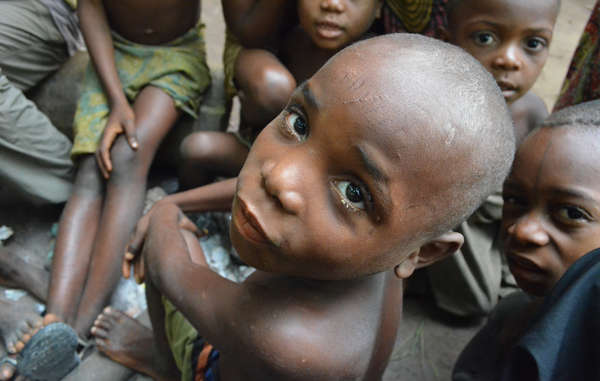
by Deep Green Resistance News Service | Jan 8, 2018 | Colonialism & Conquest
Featured image: A recent epidemic in the Republic of Congo is said to have been aggravated by the loss of indigenous peoples’ resources due to conservation and logging projects. © C. Fornellino Romero/Survival International
by Survival International
A Congolese organization has recently raised concerns that conservation contributed to the deaths of several dozen children, mostly Bayaka “Pygmies,” during an epidemic in 2016 in the Republic of Congo – the latest in a long line of related reports.
The deaths have been attributed by a medical expert to malaria, pneumonia and dysentery, aggravated by severe malnutrition.
Conservation-related malnutrition among Bayaka children in this region has been reported since 2005 at least, as the Bayaka are prevented from hunting and gathering on their lands by wildlife guards through violence and intimidation.
These guards are funded and equipped by the Wildlife Conservation Society (WCS), one of the world’s largest conservation organizations, and the logging company it has partnered with, CIB. Both organizations have failed to take effective action to prevent abuse.
“The wildlife guards abuse us. They don’t want us to go into the forest. How can we feed our children?” a Bayaka man from Mbandza, the site of the epidemic, told Survival in 2016.
These guards have been accused of abusing Bayaka and stealing their food for over 13 years. One such attack that took place in Mbandza in early 2016 left one man hospitalized.
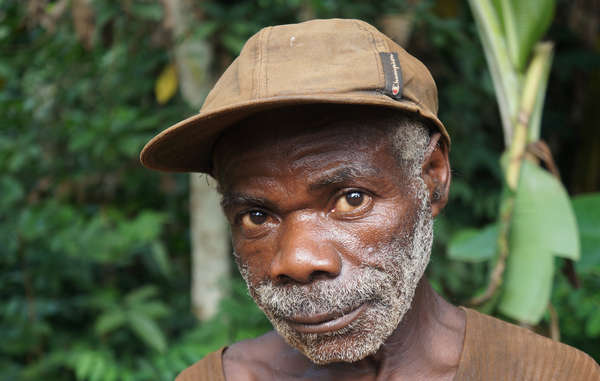
The Baka and Bayaka’s consent is required by law for any major project on their lands, but this is ignored by WWF and WCS. © Survival International
In this way, the Bayaka are being illegally evicted from their ancestral homelands by threat of violence. As one Bayaka woman explained: “If we go into the forest we eat well there compared to the village. We eat wild yams and honey. We want to go into the forest but they forbid us to. It frightens us. It frightens us.”
Critics have noted that the guards have also failed to protect the wildlife the Bayaka depend on for food, since they have difficulty tackling corruption and the creation of logging roads, the two main drivers of poaching.
Plummeting health has been reported among Bayaka living in the Dzanga-Sangha Protected Areas in the Central African Republic – one of the World Wildlife Fund’s (WWF) flagship projects – since 2006. Conditions encountered among older women “would be considered a public health crisis by international health agencies,” according to research published in 2016.
Increased malnutrition and mortality have been reported among Baka “Pygmies” in Cameroon, where WWF also operates, and among Batwa “Pygmies” in another of WCS’s project sites in east Democratic Republic of Congo.
“Now we are afraid of the anti-poaching squads. Before when a woman gave birth we took her to the forest to help her regain her strength and weight, now we can’t do this. We would take our children to the forest to avoid epidemics. Now we know illnesses we never knew before,” one Baka woman in Cameroon told Survival.
Watch Baka describe the abuse they face as a result of WWF’s conservation projects
Baka health plummets due to conservation
In the Congo Basin, the Baka, Bayaka and dozens of other rainforest peoples are being illegally evicted from their ancestral homelands in the name of conservation. Their health is plummeting as a result.
The big conservation organizations that support these conservation projects, like the World Wildlife Fund (WWF), refuse to abide by basic international standards and secure their consent.
Neither WCS nor WWF has attempted to secure the indigenous peoples’ consent, as basic due diligence and their own human rights policies require.
Survival’s Director Stephen Corry said: “Land theft is a serious and deadly crime, as these reports show. Many associate conservation with reason and compassion but, for Baka and Bayaka, it often means mindless violence and plummeting health. When will WWF and WCS finally start complying with their own human rights policies? ”
Timeline
1996: The organization Berggorilla & Regenwald Direkthilfe finds that malnutrition and mortality has increased among Batwa “Pygmies” since they were evicted from Kahuzi-Biega, a national park in east Democratic Republic of Congo (DRC) funded by WCS.
1997: WWF observes that the fact that the Bayaka are banned from hunting or gathering inside the Dzanga-Ndoki Park, the park in the Central African Republic (CAR) that WWF helped to create, “punishes [the Bayaka] severely” and is undermining their food security.
2000: A study finds that the Batwa in Kahuzi-Biega, DRC, are suffering from nutritional deficiencies, because they are no longer able to hunt in the forest, and soaring mortality rates. Malnutrition is particularly pronounced among women and children.
2004: A BBC investigation into CIB’s logging concessions in Congo hears from a Bayaka man: “We get so much suffering because of [wildlife] guards. We can’t go and find things in the forest as we used to. All we hear is hunger.”
2004: Bayaka from another community in Congo report to Greenpeace: “Then we met another white man (WCS) who came to tell us to stop hunting and that the wildlife guards would make sure we did. Now we are afraid to go far in the forest in case the wildlife guards catch us so we have to stay in the village. […] Now we are dying of hunger.”
2005: The Congolese Observatory on Human Rights, the organization that reported on the 2016 epidemic, documents three cases of violent abuse against Bayaka by wildlife guards, and warns that some Bayaka “are dying of hunger.”
2005: A news report recounts how Bayaka in one of CIB’s logging concessions describe being targeted by wildlife guards that mistreat and temporarily imprison them, and how this has led to more frequent malnutrition among children and vulnerable adults.
2006: WWF and its partners commission a report that finds that the Bayaka in Dzanga-Sangha, CAR, are struggling to feed themselves. The Bayaka interviewed for the report state that the conservation project has forced them out of some of their richest hunting and gathering grounds. They report that wildlife guards harass or attack them even when they try to use the reduced areas of land they have left, all the while accepting bribes from the real poachers who were emptying the forest of its wildlife. Some Bayaka women are finding it so hard to find food, the investigator hears, that they have been driven to sex work in the nearby town.
2006: An article in The Lancet cautions that “Pygmy peoples’ health risks are changing as the central African forests, which are the basis for their traditional social structure, culture, and hunter-gatherer economy, are being destroyed or expropriated by […] conservation projects:”
2008: UNICEF warns that the Bayaka’s right to gather resources is being “flouted on the most basic level because indigenous people no longer have access to areas rich in game” due to protected areas in Congo.
2012: An anthropologist with 18 years’ experience working with Bayaka in Congo reports increasingly poor nutrition and increased mortality. He attributes this to the removal of forest resources by loggers and to “conservationists’ exclusionary and draconian management practices.”
2013: A researcher at the University of Oxford reports that the combined impact of conservation and logging have led to poorer health and higher levels of drug and alcohol addiction among the Bayaka. He argues that conservation efforts would benefit from gaining people’s consent
2014: A medical study finds that “punitive anti-poaching measures” and dwindling wildlife have caused health to plummet among Bayaka in Dzanga-Sangha, CAR, particularly among women. “It is disheartening to see health decline so closely tied […] to the conservation management policies of the last twenty-five years,” the study’s authors note.
2015: A doctor with extensive experience working in CIB’s logging concessions reports that: “Aside from wounds inflicted by gorillas, buffalo or other wild animals, my colleague and I also see [gun] wounds in people claiming to have been attacked – sometimes without warning – by the protectors of wildlife: the wildlife guards.”
2015: The same doctor tells Survival: “I find this [wildlife guard violence] a very serious problem and in my opinion most wildlife guards have other motives than protecting the animals to work as a wildlife guard.”
2016: A second doctor with extensive experience working in CIB’s logging concessions describes to Survival the seasonal malnutrition she encounters among Bayaka, which she attributes to repressive conservation policies.
“Pygmy” is an umbrella term commonly used to refer to the hunter-gatherer peoples of the Congo Basin and elsewhere in Central Africa. The word is considered pejorative and avoided by some tribespeople, but used by others as a convenient and easily recognized way of describing themselves.
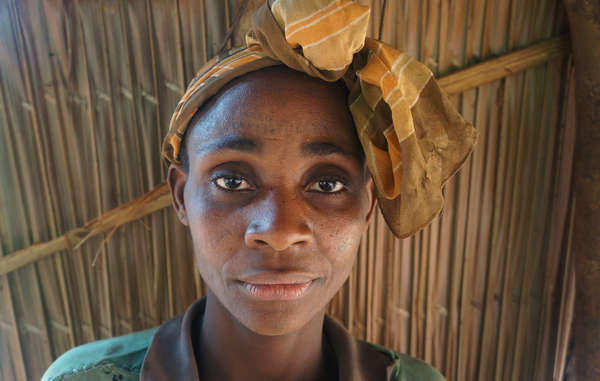
by Deep Green Resistance News Service | Sep 6, 2017 | Lobbying
Featured image: This Baka woman and her husband are among many tribal people in Cameroon who have been beaten by WWF-funded wildlife guards. They were attacked and had their belongings taken from them while they were collecting wild mangoes. © Survival International
by Survival International
The landmark mediation talks between Survival and the World Wildlife Fund (WWF) over breaches of Organization for Economic Co-Operation and Development (OECD) guidelines for multinational corporations have broken down over the issue of tribal peoples’ consent.
Survival had asked WWF to agree to secure the Baka “Pygmies’” consent for how the conservation zones on their lands in Cameroon were managed in the future, in line with the organization’s own indigenous peoples policy.
WWF refused, at which point Survival decided there was no purpose continuing the talks.
Survival lodged the complaint in 2016, citing the creation of conservation zones on Baka land without their consent, and WWF’s repeated failure to take action over serious human rights abuses by wildlife guards it trains and equips.
It is the first time a conservation organization has been the subject of a complaint under the OECD guidelines. The resulting mediation was held in Switzerland, where WWF is headquartered.
WWF has been instrumental in the creation of several national parks and other protected areas in Cameroon on the land of the Baka and other rainforest tribes. Its own policy states that any such projects must have the free, prior and informed consent of those affected.
A Baka man told Survival in 2016: “[The anti-poaching squad] beat the children as well as an elderly woman with machetes. My daughter is still unwell. They made her crouch down and they beat her everywhere – on her back, on her bottom, everywhere, with a machete.”
Another man said: “They told me to carry my father on my back. I walked, they beat me, they beat my father. For three hours. Every time I cried they would beat me, until I fainted and fell to the ground.”
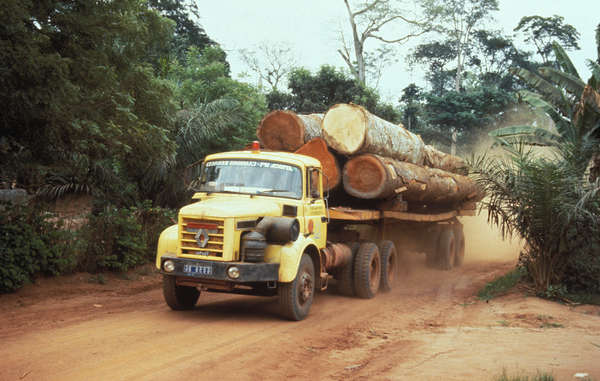
Conservation has been used as a justification for forcibly denying Baka access to their land, but the destruction of the rainforest by logging companies – some of whom are WWF partners – has continued. © Margaret Wilson/Survival
Background briefing
– Survival first raised its concerns about WWF’s projects on Baka land in 1991. Since then, Baka and other local people have repeatedly testified to arrest and beatings, torture and even death at the hands of WWF-funded wildlife guards.
– The OECD is the Organization for Economic Co-Operation and Development. It publishes guidelines on corporate responsibility for multinationals, and provides a complaint mechanism where the guidelines have been violated.
– The complaint was lodged with the Swiss national contact point for the OECD, as WWF has its international headquarters in Switzerland. Talks took place in the Swiss capital, Bern, between representatives of WWF and Survival.
– The principle of Free, Prior and Informed Consent (FPIC) is the bedrock of international law on indigenous peoples’ rights. It has significant implications for big conservation organizations, which often operate on tribal peoples’ land without having secured their consent.
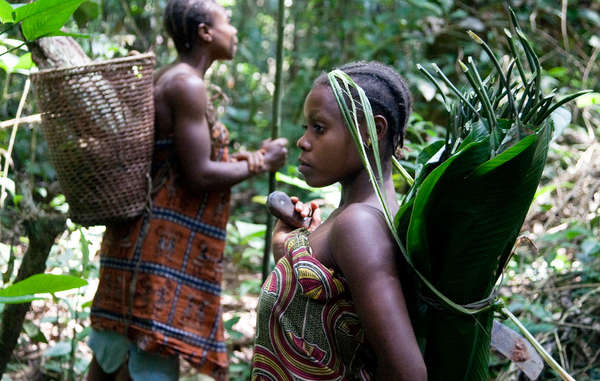
Tribes like the Baka have lived by hunting and gathering in the rainforests of central Africa for generations, but their lives are under threat. © Selcen Kucukustel/Atlas
Tribal peoples like the Baka have been dependent on and managed their environments for millennia. Contrary to popular belief, their lands are not wilderness. Evidence proves that tribal peoples are better at looking after their environment than anyone else. Despite this, WWF has alienated them from its conservation efforts in the Congo Basin.
The Baka, like many tribal peoples across Africa, are accused of “poaching” because they hunt to feed their families. They are denied access to large parts of their ancestral land for hunting, gathering, and sacred rituals. Many are forced to live in makeshift encampments on roadsides where health standards are very poor and alcoholism is rife.
Meanwhile, WWF has partnered with logging corporations such as Rougier, although these companies do not have the Baka’s consent to log the forest, and the logging is unsustainable.
Survival’s Director Stephen Corry said: “The outcome of these talks is dismaying but not really surprising. Conservation organizations are supposed to ensure that the ‘free, prior and informed consent’ of those whose lands they want to control has been obtained. It’s been WWF’s official policy for the last twenty years.
“But such consent is never obtained in practice, and WWF would not commit to securing it for their work in the future.
“It’s now clear that WWF has no intention of seeking, leave alone securing, the proper consent of those whose lands it colludes with governments in stealing. We’ll have to try other ways to get WWF to abide by the law, and its own policy.”
Watch: Baka father speaks out against horrific abuse
“Pygmy” is an umbrella term commonly used to refer to the hunter-gatherer peoples of the Congo Basin and elsewhere in Central Africa. The word is considered pejorative and avoided by some tribespeople, but used by others as a convenient and easily recognized way of describing themselves.
by Deep Green Resistance News Service | Apr 21, 2017 | Strategy & Analysis
by Will Falk / Deep Green Resistance
In my essay, Park City is Damned: A Case Study in Civilization, I described the vicious cycle Park City, Utah is caught in and explained how the city cannot exist for much longer.
There are far more humans in Park City than the land can support, so the necessities of life must be imported. Importing these necessities costs money and requires an industrial infrastructure. Park City makes its money through a tourist industry that relies on snow, but climate change, produced by the same industrial infrastructure bringing the necessities of life, is destroying the snow. The industrial infrastructure must be dismantled to stop climate change so the snow may survive. Either the snow or the industrial infrastructure will fail.
And, Park City will, too.
Not long after the essay was published, I attended a gathering for an emerging group PCAN! or Park City Action Network. The gathering’s goals included to “create a network for young professionals and build community, to learn what’s going on in local politics, and to find other like-minded individuals to create a strong collective voice.”
I think I’m still young (turned 30 in March), I have a law degree and license (in Wisconsin), and I’m interested in finding like-minded individuals to create a strong collective voice, so I went.
A man approached me, and said. “You’re Will Falk, right? You wrote that article?”
I was embarrassed and nervous people were going to hate me for what I wrote. But, his eyes and body language were sincere, so I told the truth. He asked, “So, you think Park City won’t last?
“Can’t physically last,” I clarified.
“ Right. And, solar power isn’t the answer? Wind power, either?”
“No,” I responded. He looked at me earnestly for a few seconds, looked around at the room of concerned, young professionals, and said, more to himself than to me, “Park City is still damned huh?”
“Still damned,” I said. He sighed and asked,“What the hell have we been working on all this time?”
I shrugged. I wasn’t sure what to say, but I could see acceptance in his face. I simply tried to meet his gaze. Finally, he asked, “What can I do?”
***
Park City’s vicious cycle is a reflection of the vicious cycle the global human population is caught in. There are far more humans than the planet can support sustainably, so the necessities of life must be stolen from non-humans and the future. This theft is managed through an industrial infrastructure powered by fossil fuels and the operation of this infrastructure is destroying the planet’s total life-supporting capacity. It is pushing the climate to temperatures too warm for most species, pushing oceanic life perilously close to total collapse, and contaminating, with toxins and carcinogens, the bodies of every civilized individual.
Unfortunately, with more than half the global human population now living in cities, most humans depend on this system for food, for clean water, and for shelter. Humans have backed themselves into a corner. If this system collapses, huge, urban populations of humans will be left without the necessities of life. But the system must collapse for the planet to survive. Ignorance of physical reality cannot save us from it; either the planet or the industrial infrastructure will fail.
Basic ecology gives us another way to understand this. In ecologic terms, humans have overshot the planet’s carrying capacity through dependence on a drawdown method of temporarily extending carrying capacity. Crash is inevitable, and the longer drawdown occurs, the smaller Earth’s total carrying capacity will be after the crash.
Humans are animals and, as animals, require habitat. Every habitat has a total life-supporting capacity, or carrying capacity. Carrying capacity is the maximum population of a given species which can be supported by a particular habitat indefinitely. Earth, even as the largest habitat, is finite with a specific carrying capacity.
In his ecological classic Overshoot: The Ecological Basis of Revolutionary Change, Dr. William R. Catton Jr. explains that civilized humans “have several times succeeded in taking over additional portions of the earth’s total life-supporting capacity, at the expense of other creatures.”
Catton’s phrase “at the expense of other creatures” is a nice way of describing extermination. Using 1970 population totals and current trends, the World Wildlife Fund recently published a prediction that by 2020 two-thirds of the Earth’s total vertebrate population (mammals, birds, fish, amphibians, and reptiles) will have been killed by human activities. Biologist Paul Ehrlich, who studies population at Stanford University, says that half of all individual life forms humans are now aware of have already disappeared.
Civilized humans have learned to rely on technologies that augment human carrying capacity in temporary ways. These augmentations are necessarily temporary because the finiteness of every habitat places physical limits on population growth. In other words, you can’t steal more than everything.
The latest and deadliest of the technologies humans have used to augment carrying capacity revolve around the exploitation of the “planet’s energy savings deposits, fossil fuels.” Through these exploitative technologies powered by fossil fuels, Catton argues, civilized humans are now engaged in a “drawdown method of extending carrying capacity.” This method is “an inherently temporary expedient by which life opportunities for a species are temporarily increased by extracting from the environment for use by that species some significant fraction of an accumulate resource that is not being replaced as it is drawn down.”
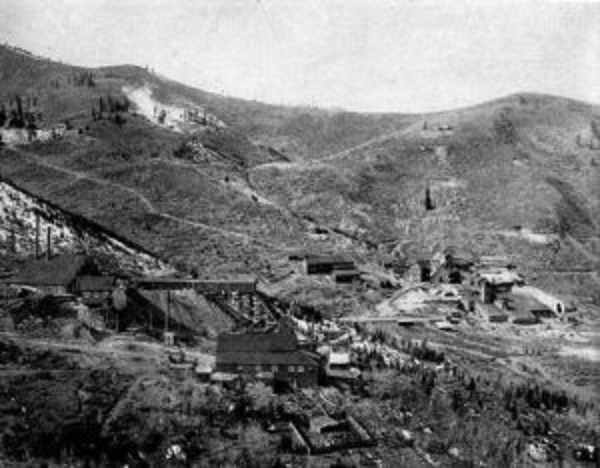
Daly West and Quincy Mines in Park City (circa 1911) / Wikimedia
This drawdown has allowed humans to overshoot the planet’s carrying capacity. Overshoot leads to a situation where a portion, or even all, of a population cannot be supported when temporarily available, and finite, resources are exhausted. When these resources run out, crash inevitably follows.Civilized humans are destroying countless so-called “resources” that are not being replaced as they are murdered. The extraction of fossil fuels is an easy example. But, civilized humans are also cutting forests and plowing grasslands faster than they can grow back, they’re stripping topsoil faster than it rebuilds, and they’re heating the planet more intensely than life can evolve to keep pace.
Richard Heinberg, Senior Fellow at the Post Carbon Institute, describes what is happening as the ecological phenomenon known as “population bloom” in his book The End of Growth: Adapting to Our New Economic Reality. When a species finds an abundant, easily acceptable energy source (in our case, fossil fuels), its numbers increase while taking advantage of the surplus energy. Speaking to the inevitability of crash, Heinberg writes, “In nature, growth always slams up against non-negotiable constraints sooner or later…Population blooms (or periods of rapid growth) are always followed by crashes and die-offs. Always.”
Crash following overshoot is bad enough, but the problem doesn’t end there. If a population exists in overshoot for too long, drawing down too many of its habitat’s necessities of life, the habitat’s carrying capacity can be permanently reduced. To use simple numbers, start with a carrying capacity of 1000 humans. What happens if 1200 humans, then 1500 humans, then 2000 humans live on the land for too long? Or those original 1000 humans steal other creatures’ carrying capacity and convert it to human use?
That land base’s carrying capacity can be permanently reduced to 800 humans, 400, and so on, over time, all the way to zero. Eventually, the population will crash and that land base will never be capable of supporting humans, or any other life, again. This is as true for the carrying capacity of a small locale like Park City as it is for the carrying capacity of the whole planet.
The horror we live with comes into focus. Most human lives are made possible by a system that will collapse, and the longer that system operates, literally eating Earth’s total carrying capacity, the less chance other lives – human and non-human – have to continue existing.
We have two choices. We can live in denial, even as the evidence of the planet’s murder piles around us. We can anesthetize ourselves with the comforts produced by this insane arrangement of power. We can pray for our own death before the worst of the collapse happens. In short, we can do nothing.
Or, accepting responsibility as people who love each other, love our non-human kin, and love life, we can stop the industrial system from destroying our beloveds.
Once you’ve decided to stand on the side of life, the question becomes, How? How do ensure as much life as possible will survive the coming crash? How do we stop industrial civilization from permanently reducing the planet’s carrying capacity to nil?
***
Longtime environmental activists and writers Derrick Jensen, Lierre Keith, and Aric McBay created a concrete strategy for an effective resistance movement in their book Deep Green Resistance. They named that strategy “Decisive Ecological Warfare (DEW).”
Before you object to the term “warfare,” consider this: In the past, wars killed humans. Today, with human activities killing 200 species daily, we are engaged in a war where whole species are exterminated. We readily recognize the chemical warfare characterizing so many conflicts of the last century and, today, industrial processes create a reality where every mother on the planet now has dioxin, a known carcinogen,in her breast milk.
This is a war. And, we are losing. Badly. If we’re going to win this war, we need to act like a serious resistance movement.
DEW gives us a comprehensive strategy. It is centered on two primary goals. Goal 1 is “to disrupt and dismantle industrial civilization; to thereby remove the ability of the powerful to exploit the marginalized and destroy the planet.” Goal 2 is “to defend and rebuild just, sustainable, and autonomous human communities, and, as part of that, to assist in the recovery of the land.”
Disrupting and dismantling industrial civilization is primary. If industrial civilization is not stopped, then the second goal will be impossible. The land will be pushed past its ability to recover and there will be too few necessities of life left to support autonomous human communities.
Accomplishing these goals will involve five smaller strategies. First, resisters will “engage in direct militant actions against industrial infrastructure.” This may frighten some people and others may feel physically incapable of actions like these. If you can’t engage in these kinds of actions, the people who can will need your material support. In a place like Park City, steeped in privilege, the most obvious form of support the community could offer is money. Those in power are incredibly well-funded. We’ll never match them dollar for dollar. But, that doesn’t mean money can’t be put to good use.
Second, they will “aid and participate in ongoing social and ecological justice struggles; promote equality and undermine exploitation by those in power.” My friend Rachel Ivey, a brilliant feminist writer and organizer, often connects social and ecological justice with the truth that, “Oppression is always tied to resource extraction.” This means that industrial civilization has been built on the backs of people of color, indigenous peoples, the poor, and women. These groups are often on the movement’s front lines, fighting for survival. We must join them in true solidarity.
Third, they will “defend the land and prevent expansion of industrial logging, mining, construction, and so on, such that more intact land and species will remain when civilization does collapse.” Pipeline and port blockades, tree sits, and other forms of non-violent direct action aimed at physically preventing those in power from destroying more of the land is an essential piece of the puzzle. There are roles in the resistance for pacifists and others personally and philosophically unwilling to engage in more militant actions.
Fourth, they will “build and mobilize resistance organizations that will support the above activities, including decentralized training, recruitment, logistical support, and so on.” A serious resistance movement needs artists, writers, and those skilled in marketing and mass media communications. It also needs quartermasters, organizational psychologists, and others trained in logistical thinking.
Finally, resisters will “rebuild a sustainable subsistence base for human societies (including perennial polycultures for food) and localized, democratic communities that uphold human rights.” As collapse intensifies, we are going to need permaculturists, gardeners, and urban farmers to produce food when the industrial networks, currently transporting food, fail.
All kinds of skills will be necessary to stop industrial civilization, but the most important thing is that industrial civilization is actually stopped. All of our efforts must support this primary goal. Right now, the dominant system is barreling down a path that ends in total ecological collapse. Not only is the human species endangered with extinction, but every species – save, maybe a few microscopic species of bacteria – is threatened with annihilation. Before anything else, we must knock the dominant system off that path.
***
I return to answering the question, “What can I do?”
This is the wrong question. Don’t ask, “What can I do?” Instead ask, “What needs to be done?”
Go outside. Look around. Take a deep breath. Feel the oxygen, exhaled by trees, seep into your lungs. Let your breath go, and listen as the trees inhale the carbon dioxide your breath releases. Ask those trees what they need.
Climb to the top of the nearest hill. Find a boulder to sit on and wait. Match the land’s patience. Let gravity pull your bones closer to their ancestors, the bones of the earth. Watch the ants march, dutifully performing work for their community. Listen to the geese arriving for the spring, celebrating their return. Ask the stones, the ants, and the geese what they need. Ask them what needs to be done.
They’ll tell you they need to live.
The trees will tell you that warming temperatures cause cavitation, or bubbles, in the water flowing from their roots to their topmost leaves and that these bubbles kill them as surely as artery blockages kill humans.
The stones will tell you how quickly everything has changed. They will tell you how species they used to watch disappeared faster than stones, who exist on geologic time, can contemplate. They will tell you about mountain top removal, open-pit mining, and earthquakes caused by fracking.
The ants will tell you how they’ve long been involved in planetary cooling processes. They’ll show you how they’re working as hard as they can to build limestone by freeing calcium carbonate from minerals in the soil. And, in the process, trapping as much carbon dioxide as they can.
The geese will tell you of frantic searches for disappearing wetlands, of once wild rivers dammed, drying, and no longer flowing to the sea.
When you stop asking “what can I do?” to begin asking “what needs to be done?” it is true, you may expose yourself to a world in pain. But, you’ll also find countless allies asking the same questions you are. You may rip the scar tissue of denial that has been shielding your eyes from the near-blinding truth. But, once you let the sunlight in, once you step outside into the real world, you’ll open yourself to a world fighting like hell to survive.
We’ve been waiting for you.
Will Falk moved to the West Coast from Milwaukee, WI where he was a public defender. His first passion is poetry and his work is an effort to record the way the land is speaking. He feels the largest and most pressing issue confronting us today is the destruction of natural communities. He received a Society of Professional Journalists, San Diego Chapter, 2016 Journalism award. He is currently living in Utah.
To repost this or other DGR original writings, please contact newsservice@deepgreenresistance.org
by Deep Green Resistance News Service | Jan 23, 2017 | Colonialism & Conquest
Featured image: Without access to their ancestral land, the Baka’s health has deteriorated and they face an uncertain future. © Survival International
by Survival International
An internal report commissioned by the World Wildlife Fund (WWF) into the impact of its conservation work in Cameroon on Baka “Pygmies” has been leaked after WWF denied it existed. It reveals:
—WWF knew that the Baka had not been consulted over the national parks which have taken over their land. However, the organization has since maintained publicly that there was “a high level of … community consent.”
—Some ecoguards patrolling the area “behave like masters and lords” towards the Baka, mounting “crackdowns” that are “terrifying.” Despite this, a WWF spokesman described the ecoguards as “performing their designated function of protecting the forests and securing the access and areas of forest communities, including … the Baka.”
—Many perpetrators of abuses are not disciplined when violations are reported by the communities “despite the communities’ condemnation, with proof.” WWF, however, continues to say publicly, “When unacceptable behavior has come to WWF’s attention… WWF has taken the issue up directly and emphatically with [the government], and improved behavior has seemed to follow.”
—“Most of the local villages are affected [by ecoguard abuse]” – but WWF maintained in a written submission to the OECD that “the possibility of ecoguard abuse does not currently seem to be a high priority for most Baka communities.”
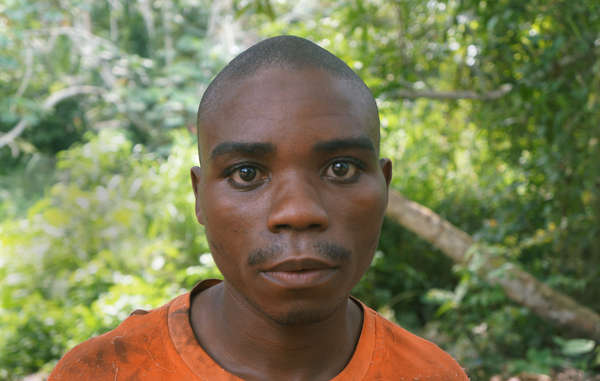
This Baka man was beaten by guards. Survival has spoken to dozens of similar victims across the Congo Basin.
© Survival International
Contrary to its own guidelines, WWF has never released the report, despite requests from Survival International and Baka activists. In an interview with the environmental magazine Mongabay, WWF’s “Head of Issues Management” Phil Dickie denied that WWF had commissioned any investigation into Survival’s allegations.
Survival International lodged a formal complaint in February 2016 with the Swiss National Contact Point of the OECD over WWF’s activities in Cameroon. The complaint was admitted in December 2016, the first time a non-profit organization has been scrutinized in this way.
One Baka man said: “The forest used to be for the Baka but not anymore. We would walk in the forest according to the seasons but now we’re afraid. How can they forbid us from going into the forest? We don’t know how to live otherwise. They beat us, kill us and force us to flee.”
Survival’s Director Stephen Corry said: “WWF commissions a report to look into its effect on the Baka, presumably including claims of abuse committed by the ecoguards it funds. The report confirms the abuse is widespread and routine. WWF then denies the report exists. It’s time for this big conservation organization to square up to the responsibilities it has to those who have seen their land stolen for conservation. And it’s time the world woke up to the horror that’s going on in the name of conservation. It’s not just Cameroon and not just WWF: the conservation industry has a history of taking tribal people’s land. It’s green colonialism and we’re doing all we can to fight it. Many conservationists know that tribal peoples are the best guardians of the natural world which is why the big conservation organizations should start listening to them rather than conspiring in their destruction.”
See here for a comparison of what WWF’s internal report says about Baka abuse with what WWF have said publicly, and what the Baka say. The full report is available on request.
“Pygmy” is an umbrella term commonly used to refer to the hunter-gatherer peoples of the Congo Basin and elsewhere in Central Africa. The word is considered pejorative and avoided by some tribespeople, but used by others as a convenient and easily recognized way of describing themselves.
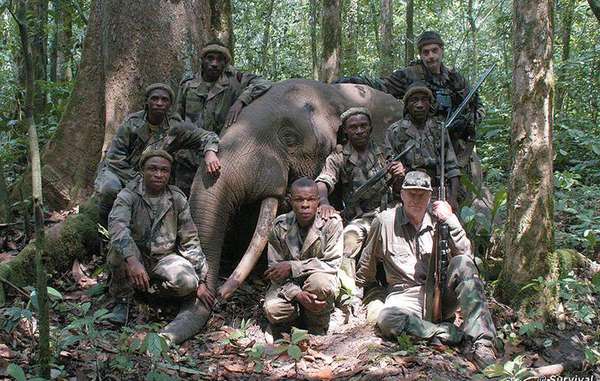
by Deep Green Resistance News Service | Nov 2, 2016 | Biodiversity & Habitat Destruction, Colonialism & Conquest
Featured image: World Wildlife Fund trustee Peter Flack with dead forest elephant. © Survival International
by Survival International
Survival International has learned that an elephant-hunting safari operation jointly owned by a French billionaire has been implicated in human rights abuses against local Baka “Pygmies” and their neighbors, including illegal evictions and torture.
The operation is based in two “protected areas” in Cameroon, leased by Benjamin de Rothschild. It offers tourists the chance to pay €55,000 to shoot a forest elephant.
Baka were evicted from their ancestral land to create the trophy hunting operation, contrary to international law. It is patrolled by soldiers, police and armed guards, and Baka have now been told they will be shot on sight if they cross it to hunt to feed their families, gather plants, or visit religious sites.
The Baka report that three of their forest camps have been burnt by wildlife guards and safari camp employees in the last year alone. Baka men hunting for food in this forest have been beaten by local police, soldiers and wildlife guards.

Benjamin de Rothschild, joint owner of a luxury elephant-hunting operation on Baka land
© JeuneAfrique
One Baka man told Survival: ”They told me to carry my father on my back. I started walking, [the guard] beat me, he beat my father. For three hours, every time I cried out they would beat me, until I fainted and fell to the ground with my father.”
Another Baka man said: “When the trophy-hunting company finds us here they burn the camps. They beat us, they search for us, they set their dogs on you, their guns on you.”
A third Baka said: “The trophy-hunting company said that if they see anyone [in the forest] bullets will fly. Now those who have family there have gone to get them out. How will we live now?”
Survival contacted Mr. de Rothschild informing him of reports of serious human rights abuses having been committed to maintain the trophy-hunting operation, but has received no reply.
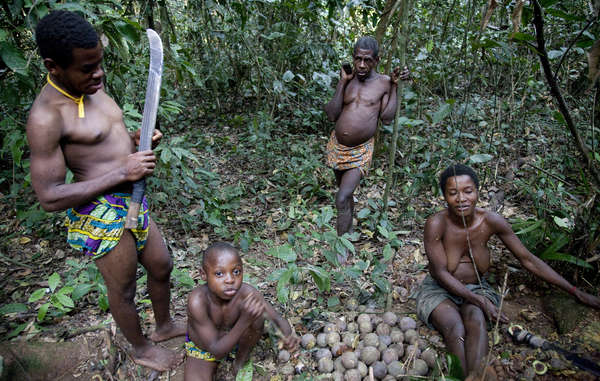
The Worldwide Fund for Nature (WWF) is very active in Cameroon, and the trophy-hunting “protected areas” form part of one of their key “conservation landscapes.” WWF has yet to comment on the allegations, or say whether it proposes to take any action.
One booking operator told Survival that: “All our luxurious fully equipped forest camps are solid construction, air conditioned with private chalets with full bathrooms and dressing parlors. Delicious multi-course cuisine is served with top shelf European wines and beverages… Our newest forest camp has a large screened in swimming pool.”
Watch: Baka plead for forest guards to leave them in peace.
© Survival International
Across the region, Baka “Pygmies” and their neighbors are being evicted from their ancestral homelands and face arrest and beatings, torture and even death while big game trophy-hunting is encouraged. WWF trustee Peter Flack has also hunted elephants in the region.
Survival’s Director Stephen Corry said: “Across Africa, rich trophy hunters are welcomed into the same areas where tribal hunters are illegally evicted from their ancestral homelands and brutalized for hunting to feed their families. This has to stop. Conservation in the Congo Basin is land theft, a continuation of colonialism. It leads to widespread and horrific human rights violations, including extrajudicial killing. Why are so few people speaking out? Survival is leading the fight against these abuses. Conservationists must respect human rights like everyone else is supposed to.”
Click here to find out more and take action.
This is not an isolated incident. Across Africa, tribal people are accused of “poaching” because they hunt to feed their families. And they face arrest and beatings, torture and death, while big game trophy hunters are encouraged. Survival International is leading the fight against these abuses.
Note: “Pygmy” is an umbrella term commonly used to refer to the hunter-gatherer peoples of the Congo Basin and elsewhere in Central Africa. The word is considered pejorative and avoided by some tribespeople, but used by others as a convenient and easily recognized way of describing themselves.










